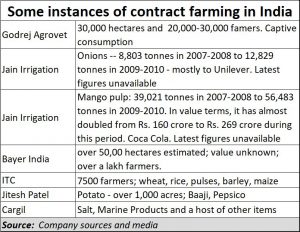https://www.firstpost.com/business/contract-farming-isnt-a-new-idea-but-govt-needs-to-incentivise-its-spread-across-india-6916941.html
The government needs to encourage contract farming, not stunt it
RN Bhaskar – July 2, 2019
Like so many good ideas in India, contract farming is also one which has existed, thrived, and made its mark. But as always, trust the government to peddle half-baked theories instead. As Niti Aayog member, Ramesh Chand remarked in a recent media interview (https://indianexpress.com/article/india/indian-agriculture-has-reached-a-stage-where-more-the-govt-intervenes-lower-will-be-the-growth-niti-aayog-member-ramesh-chand-5806846/), “Indian agriculture has reached a stage where the more the government interferes, the lower will be the growth.” He advocates freeing agriculture from controls, and creating an enabling environment for greater corporate investments in agriculture.
 One of the first measures that agriculture could adopt would be contract farming. Just look at what Jitesh Patel has been doing in Gujarat. He has taken up lands from other farmers and wellwishers, and has added it to his own holding of 150 acres. On this 1,000 acre farm he plants potatoes backed by contract farming agreements with the likes of Pepsico and Balaji.
One of the first measures that agriculture could adopt would be contract farming. Just look at what Jitesh Patel has been doing in Gujarat. He has taken up lands from other farmers and wellwishers, and has added it to his own holding of 150 acres. On this 1,000 acre farm he plants potatoes backed by contract farming agreements with the likes of Pepsico and Balaji.
It is these companies that tell him which varieties of potatoes to grow, and suggest the inputs he should use. Additionally, since Patel is himself an M Sc in agricultural sciences, he applies his mind to the techniques that must be adopted to make farming very lucrative and meaningful. A five-minute Youtube video talks about what he has been doing for the past 25 years. (https://www.youtube.com/watch?v=KgGuGtDUw5w). When this author met him a decade ago (http://www.forbesindia.com/article/india-budget-2010/how-did-gujarat-become-a-farming-paradise/11322/1), he was full of big plans, and today he has emerged as one of the most successful potato farmers in the country. Busloads of farmers come to his farms every day to take a glimpse of what is possible. He is clear that had it not been for contract farming, he could not have dared to produce such large quantities of potato.
The Jains of Jalgaon
Jain Irrigation Ltd has been immensely successful in mango pulp production – almost 50% of the procurement is sold to Coca Cola. This company is a brilliant example of how to engage in double contracts. He has contracts with mango growers, and back-to-back he has purchase and offtake contracts with Coca Cola. To ensure that he gets enough mangoes for his pulping plant, he has to guarantee his farmers attractive prices that makes their efforts worthwhile. At the same time, the company ensures that the farmer gets the kind of seeds that would yield the best pulp for its customers. Jain has also begun exporting mango pulp under its own brand. To increase yields per acre,
Jain Irrigation’s officials educate farmers on how to adopt cluster farming, growing several mango trees more compactly in clusters. That allows for the planting of more trees per acre, and increases the yield per tree. The seeds that Jain Irrigation offers the farmers also ensure that the trees don’t grow very tall making the plucking of mangoes easy and relatively inexpensive.
But then Jain Irrigation is a company that has pioneered another type of contract farming – of onions. The founder of the company, the late Bhavarlal Jain, discovered a booming market overseas for white onions – as against the pinking and reddish onions that are favoured by most Indians. These onions go in the making of pizzas, continental dishes and other delicacies in the West.
So Jain set up a biotechnology laboratory which worked on tissue culture to produce the right type of exportable onions. His method of contract farming required the farmers to use only the type of cultured seeds that his company supplied. The farmer was persuaded to sell the entire stock to Jain Irrigation (the farmer cannot sell even the smallest amount of white onions to others). And the farmer must adopt the good farming practices – including micro irrigation techniques – recommended by Jain. For Jain that created a triple benefit. He could get the onions he wanted, he could also sell his micro-irrigation equipment, and he could guarantee the offtake at prices which were backed by contracts with other purchasers across the world (http://www.forbesindia.com/article/breakpoint/bhavarlal-jains-lucky-harvest/17652/1).
Since onions have a lot of moisture in them, and can be heavy for export, Jain put up an onion dehydration plant so that the final product is barely one-fiftieth of the original weight. This is then exported globally, though a bulk of the produce is picked up by Unilever. To cater to the US markets, Jain also set up an onion processing and dehydration plant in that country – and it too has been doing great business.
What makes Jain Irrigation unusual is the way its contracts are structured. The company knows that dispute resolution in India can be a pain. In order to prevent the farmer from clandestinely selling his produce to other markets in case the market prices are higher than the contracted value, Jain offers to pay the higher price (minus 10%) and if the prices crash to pay the contracted value. This way the incentive for the farmer to cheat is minimized. The farmer has more of the upside whenever that takes place. And the company is guaranteed that the crop will reach it. Moreover since the Jains wield considerable clout in and around Jalgaon, social relationships are used to cement such contractual obligations. Today, the Jains represent one of the best strategies for contract farming.
Bayer, ITC and Godrej too
But look at other big players. Godrej Agrovet chairman, Nadir Godrej, explains how his company enters into agreements with farmers to grow palm trees, so that his company can get the palm oil that is needed (http://www.asiaconverge.com/2018/07/nadir-godrej-on-godrej-agrovet-plans/) . “In our oil palm business, we have farmers who grow the oil palm in Andhra Pradesh for us. We do have small activities in our other states too. Our total production in India is around 300,000 tonnes, while the country’s total requirement is around 15 million tonnes of edible oils which is imported; of that around 10 million tonnes of palm oil is imported. . . . . Roughly, we would have 30,000 hectares and we probably have 20,000-30,000 famers for oil palm. We provide them with extension services as part of our CSR,” says Godrej.
Then look at players like ITC (https://www.itcportal.com/businesses/agri-business/agri-commodities-and-rural-services.aspx) which enters into contract farming agreements for all types of crops – wheat, rice, pulses, maize etc, which it then converts into flour, or packages them for sale as quality grain to consumers. Its agro food division would not have been as big and profitable had it not been for carefully structured contract farming agreements.
Or look at Bayer India which has been engaged in contract farming for its seeds, which it then sells into the market. While the acreage for Bayer is not known (it is estimated to be around 50,000 hectares), what is unusual about Bayer is its insistence on fair practices including the avoidance of child labour on any of the fields, or in any of the activities related to such contract farming activities.
A dedicated team within Bayer was formed to put its Child Care Program (CCP) into practice. Besides a contractual ban on child labour, Bayer also monitors such schemes and works on incentives too. A bonus on the procurement price is paid to farmers who do not engage in child labour. If the farmer is found employing child labour a second time, the company cuts 10 percent of the procurement price. A third violation terminates the contract.
Today, as of 2018, this sustainable program covers crop cultivation areas in India like Madhya Pradesh, Andhra Pradesh, Karnataka, Tamil Nadu, Maharashtra and Gujarat. Bayer India now has farmers who follow our principle of zero tolerance to child labour.
Unconventional crops
But there are times when contract farming also allows some non-traditional areas to grow. Take for instance seaweed farming. Seaweed is an excellent form of nutrition, and has byproducts and catalysts that are much in demand by the food industry. One of the big players in contracting the growing of seaweed is Pepsico (http://www.asiaconverge.com/2018/06/harvesting-seaweed/). Today, seaweed farming promises to become one of the most attractive businesses in India.
Currently, almost everyone knows of the benefits of contract farming – even though some states continue to ban it. Some others have tremendous distrust of contract farming. (https://www.orfonline.org/expert-speak/how-to-make-contract-farming-beneficial-for-indian-farmers-50602/ Jayshree Sengupta). After all, big corporations have money power which translates to bargaining power vis-à-vis the farmers.
In order to prevent big corporations from using their power over small farmers and reducing payments to them, the government finally came out with Model Contract Farming Act 2018. This piece of legislation lays special emphasis on protecting the interests of the farmers, considering them as weaker of the two parties entering into a contract. One of the key features of the Model Act, to be adopted and enacted by the states is that it brings contract farming outside the ambit of the APMC Act. It provides for a “Registering and Agreement Recording Committee” or an “Officer” at the district/block/taluka level for online registration of sponsor and recording of agreement. The contracted produce will also be covered under crop/livestock insurance in operation.
The act provides for the promotion of Farmer Producer Organization (FPOs)/Farmer Producer Companies (FPCs) to mobilise small and marginal farmers. The FPO/FPC can also be a contracting party if so authorized by the farmers. A key feature of this Act includes an accessible and simple dispute settlement mechanism at the lowest level possible for quick disposal of disputes.
Will the forthcoming budget provide incentives for contract farming? Will it get additional access to bank funds, with measureable deliverables?
The coming fortnight will tell.










































COMMENTS